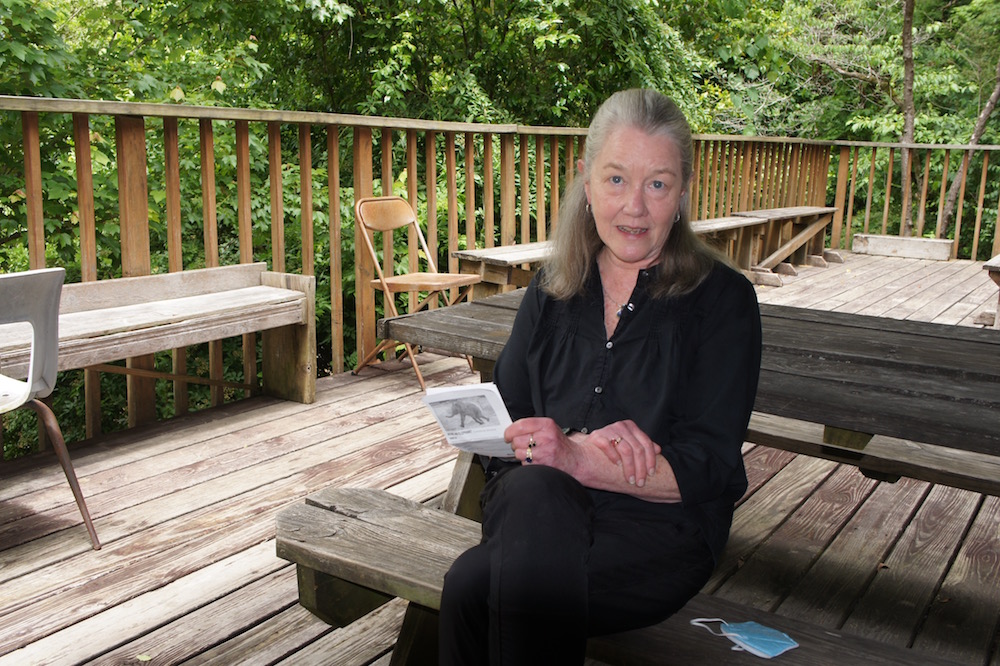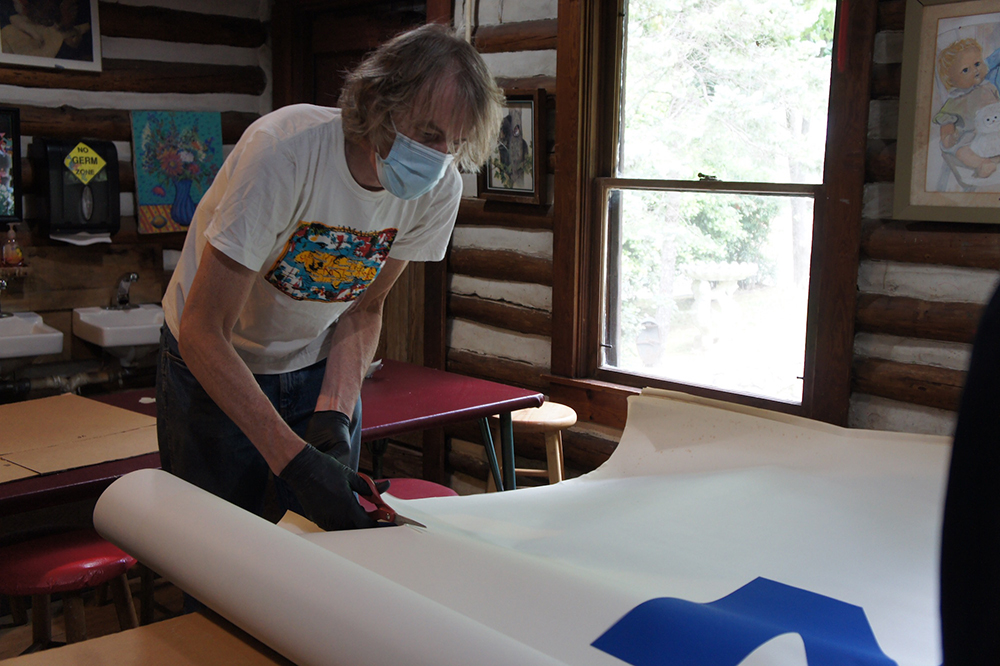
Photos by Stell Simonton
Director Lisa Haverty’s decision to open her summer day camp in Atlanta has required careful thought and planning.
Earlier this week, Lisa Haverty cleared away board games, dolls and other items from the large central room at Haverty Hollow, the site of her Atlanta summer day camp Frog Hollow.
She set up a washing station for toys and bought a no-touch thermometer. She tacked up a list of guidelines on the front door of the log building that houses the camp. She’s had the swimming pool cleaned and readied for 80 campers ages 5 to 10.
Her bucolic after-school and summer day camp, where children dig in the dirt for worms, tend a guinea pig and frog, swim and do archery and other outdoor activities, will open this summer — although at half-capacity.
Other summer programs are not necessarily following suit. Horizons Atlanta, a summer learning program with 10 sites, has made a different decision.
Executive Director Alex Wan said nine of its sites will not be offering in-person programs. Kids won’t be splashing in the pool, going on field trips and having face-to-face lessons. Instead, Horizons programs will offer a mix of online activities and old-fashioned boxes of materials delivered to kids at home.
Across the country, summer youth programs have been disrupted by the COVID-19 epidemic. Program leaders are making decisions about whether to open their programs and how to run them differently if they do.
“Everyone is working on this. Everyone is trying to figure this out,” said Aaron Philip Dworkin, chief executive officer of the National Summer Learning Association.
Most summer learning programs are not expected to open, according to Catherine Augustine, co-author of the May 2020 report “Getting Support for Summer Learning: How Federal, State, City and District Policies Affect Summer Learning Programs.”
What the CDC says
Guidelines released this week by the Centers for Disease Control and Prevention say decisions should depend on whether a locality is in stage 1, 2 or 3 in reducing COVID-19 cases. Stage 1 is defined as a downward trajectory in documented cases for a two-week period, with stage 2 being four weeks. For areas in stage 1, programs should be limited to child care for essential workers. Areas in stage 2 can operate with enhanced social distancing.
However, determination of stage is unclear and mixed messages have come from authorities about when to reopen schools, businesses and other public facilities. What the CDC does provide are procedures for keeping kids at a distance, cleaning facilities and monitoring health.
Summer programs are preparing for delayed openings and planning for smaller groups if they do open, Dworkin said.
The pandemic and school closures have created a lot of concern about kids and families, he said. There’s concern about English language learners, kids who don’t have easy access to computers, students with disabilities and students at risk of dropping out, he said.
Some young people may be experiencing the illness and death of family members, he said. Child abuse may be occurring and going unreported.
“We don’t even know what’s happening. … Home might not be a great place to be,” Dworkin said.
The No. 1 priority of summer programs should be to make sure kids are OK, he said.
Programs need to get creative, Dworkin said. They should go with their strengths and ask what is possible. Summer learning programs should focus on specific improvement areas for kids, whether that’s math, literacy or something else, he said.
Programs also should think long term. “We’re trying to make people take the longer view. We’re going to be making up learning loss for years,” he said.
Getting creative, going beyond the computer
Horizons is a national program with local affiliates operating in 60 sites across the United States.
In mid-April, more than half of its affiliates were hoping to have in-person summer programming, said Lorna Smith, chief executive officer of Horizons National. By mid-May 85% had decided not to bring kids onsite, she said.
The thinking is that “we just can’t risk it being in-person,” she said. Parents did not feel secure.
In addition, “parents have shared that there’s a fatigue with online lessons,” said Kelly Mattox, associate vice president of marketing and communications for Horizons National.
As a result, virtual programming will be limited and varied, with structured and unstructured activities that range from one-on-one lessons and teacher check-ins to “book club” meetings to virtual field trips. Other activities will be made available for kids to do offline at home.
For example, a site at St. Richard’s Episcopal School in Indianapolis will offer several hours online each day but will also deliver STEM kits to kids each week for at-home science and math activities.
Part of the usual Horizons summer experience involves cultural offerings that connect young people to their community, with guests coming to visit and kids going on field trips.
The cultural and community engagement parts of the program will have to be online, perhaps through things like talent shows or music classes, Mattox said.
The role of geography
Geography is one factor determining whether summer youth programs will be offered in person. Decisions around opening facilities should be made by local authorities based on local data, according to the CDC guide. In mid-May West Coast and upper East Coast states were more likely to be continuing their stay-at-home orders, while many Southern and some Midwestern states were lifting those orders.
Georgia was one of the first states to reduce its restrictions. Summer day camps in Georgia were allowed to open May 14 with group sizes expanded from 10 to 20 children. The order came the same day that Dr. Anthony Fauci, a key member of the president’s coronavirus task force, testified before Congress that reopening the country too soon might lead to a pandemic that could not be controlled.

John Klopstock, a lead teacher at Frog Hollow in Atlanta, makes preparations in the arts and crafts room of the log cabin that houses the camp.
Summer programs in Georgia are not necessarily rushing to open. For example, Georgia 4-H is deferring a decision about its activities and camps until the end of May, said Kasey Bozeman, extension 4-H specialist at the University of Georgia Extension.
However, the Metro Atlanta YMCA hopes to offer its summer day camps.
In fact, most of the 10,000 YMCA day camps across the country are expected to open although they have not yet made official announcements, said Ryan O’Malley, director of public relations and reputation of YMCA of the USA.
On Monday the YMCA and the American Camp Association announced a detailed guide for day and overnight camps created in consultation with the CDC.
“Camps will look at that to see: Can we do this?” O’Malley said. “Almost all will have a reduced schedule.”
During the pandemic, 1,100 YMCA child care sites remained open to provide care for the children of essential workers, he said. As a result, the Y is already prepared to meet health and safety guidelines, he said.
There are 324 YMCA overnight camps in the country, O’Malley said.
“Overnight camps are a different challenge,” he said. Theoretically, they may be able to self-isolate from the virus by testing and screening everyone who will be attending, he said. But the resources to do that may not be available. And campers are thrown together in close quarters day in and day out — eating together, sleeping in the same room, showering in the same bathroom.
He said camps that open probably won’t do so until July. They will have to follow state and local guidelines and they will have smaller groups with less contact.
“Camp will look very different,” he said.
Considerations for opening
Haverty, who runs Frog Hollow in Atlanta, said she’s thought carefully about opening her program.
“There are many reasons for parents to say no [to the summer day camp],” she said. They may have elderly grandparents in the family. They may be health care workers whose family members have a higher risk of exposure to the virus. Other parents may be out of work and don’t want to pay for camp.
“But other parents are so grateful because they have to work,” she said. They feel the need to get their children outside during the summer.
Haverty herself stresses the value of outdoor play for children. “It helps them emotionally. They’re better able to learn,” she said.
Smith, of Horizons, emphasizes the value of community programs for kids.
“It’s really important to recognize the value of these out-of-school time programs now,” she said.
“They can keep students feeling connected. Community-based organizations can uniquely provide this.”





























